(完整版)英语人教版八年级下册第六单元教学设计
- 格式:doc
- 大小:28.01 KB
- 文档页数:5

Section A 单词shoot v.射击;发射stone n.石头weak adj.虚弱的;无力的god n.神;上帝remind v.提醒;使想起bit n.一点;小块silly adj.愚蠢的;不明事理的object n.物体;物品hide v.隐藏;隐蔽tail n.尾巴magic adj.有魔力的;有神奇力量的stick n.棍;条excite v.使激动;使兴奋Western adj.西方国家的;(尤指)欧美的;西方的fit v.适合;合身couple n.(尤指)夫妻;两人;两件事物smile v.&n.笑;微笑marry v.结婚stepsister n.继姐(妹)prince n.王子短语A little bit 有点儿;稍微instead of 代替;反而turn…into 变成once upon a time从前get married结婚fall in love爱上;喜欢上句型1.As soon as the man finished talking,Yu Gong said that his familycould continue to move the mountains after he died.这个人一说完,愚公就说他去世后他的家人可以继续移山。
2.Because they were so big that it took a long time to walk to theother side.因为它们是如此大以至于步行到另一边要花费很长时间。
句型1.Tonight,when the moon is shining bright,we’ll be able to see th e stones.今晚,当月光明亮地照耀着大地时,我们就能看见这些石头了。
2.As soon as you wake up,you must go to the forest with your father.你们一醒就必须和你们的父亲去森林。
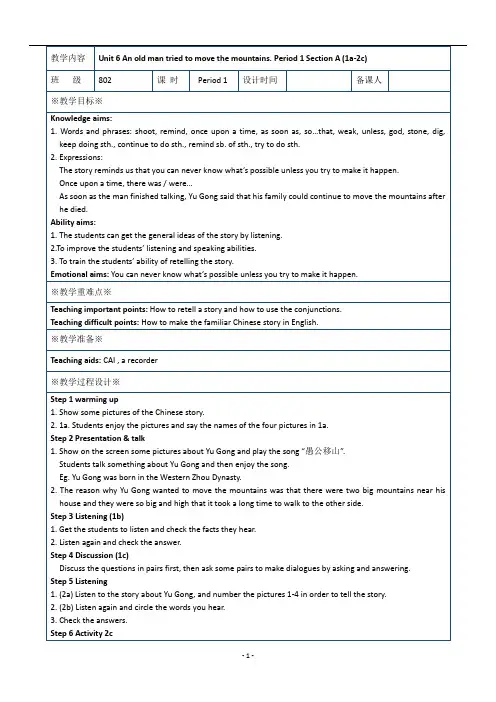
- 1 -- 3 -- 5 -Knowledge aims:1. Words: wife, husband, ground, voice, brave, bright, stepmother, scene2. Phrases: get lost, wake up, make a plan, in the moonlight, shining bright, change the plan, something bad,not… until, be make of, brave enough, plan to do sth.Ability aims: Be able to write a reasonable story ending according to the development of the story.Emotional aims: Reading makes a full man.※教学重难点※Teaching important points: To understand the performance of the western fairy tales, try to use the form of performance or generalization to carry out the language output.Teaching difficult points: The interpretation of the play and the proper use of words.※教学准备※Teaching aids: CAI※教学过程设计※Step 1 Talking1. (2a) Show some fairy tales. Tell Ss a fairy tale is an old, tradi tional story. Do you know what these fairy stories are about? Now discuss them with your partner.2. Ask some Ss say what they know about the fairy stories.e.g. Sleeping Beauty:A lovely princess had to sleep for 100 hundred years because of an evil magic. One hundred years later, ayoung prince came and saved the princes. They got married and had a happy life.Step 2 Reading1. Work on 2b. Tell Ss the following is a fairy tale. It’s name’s Hansel and Gretel.2. Before ReadingAsk Ss to read through the passage and decide what kind of text it is. Is it a letter, a play a short story or so mething else? (Ss may find out that it’s a play.)3. Fast Reading:1) T: Now let’s work on 2b. First, let’s read the questions and make sure we know the meanings of all thequestions. Then read the passage quickly and find the answers to the questions.2) Ss read the letter quickly and try to find the answers to the two questions.3) Check the answers with the class.4. Careful Reading: Work on 2c1) T: Now let’s read the play carefully and try to match each description below with the correct scene.2) Ss read the play care fully and try to match each description.3) Check the answers with the class.5. Post reading: Work on 2d1) Now let’s work on 2d. First read the questions below. Then try to read the play again and find the answersto the questions.2) Ss read the play again and try to find the answers to the questions.3) Let some Ss read their answers and correct their mistakes.4) Ss check their answers with their partners.Step 3 Language points1. One year, the weather was so dry that no food would grow.eg.: That bird’s song is so beautiful that we would follow it.2. We thought you were never coming back.We thought… 表示人们过去的某种想法,判断等,可以译作“我们原想……; 我们本以为……”。
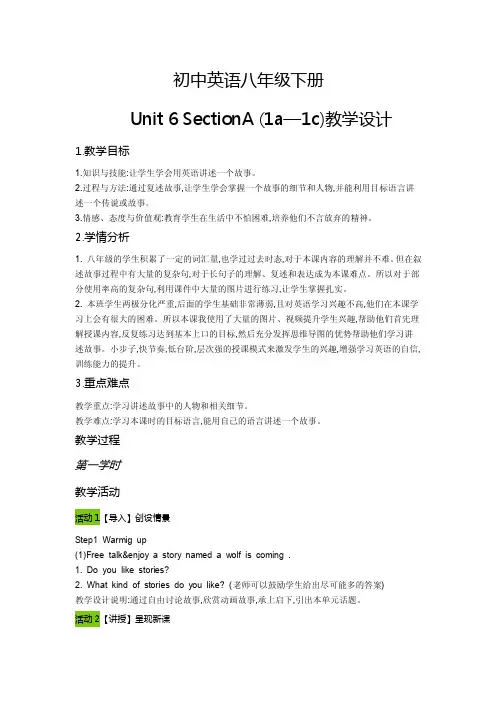
初中英语八年级下册Unit 6 SectionA (1a—1c)教学设计1.教学目标1.知识与技能:让学生学会用英语讲述一个故事。
2.过程与方法:通过复述故事,让学生学会掌握一个故事的细节和人物,并能利用目标语言讲述一个传说或故事。
3.情感、态度与价值观:教育学生在生活中不怕困难,培养他们不言放弃的精神。
2.学情分析1. 八年级的学生积累了一定的词汇量,也学过过去时态,对于本课内容的理解并不难。
但在叙述故事过程中有大量的复杂句,对于长句子的理解、复述和表达成为本课难点。
所以对于部分使用率高的复杂句,利用课件中大量的图片进行练习,让学生掌握扎实。
2. 本班学生两极分化严重,后面的学生基础非常薄弱,且对英语学习兴趣不高,他们在本课学习上会有很大的困难。
所以本课我使用了大量的图片、视频提升学生兴趣,帮助他们首先理解授课内容,反复练习达到基本上口的目标,然后充分发挥思维导图的优势帮助他们学习讲述故事。
小步子,快节奏,低台阶,层次强的授课模式来激发学生的兴趣,增强学习英语的自信,训练能力的提升。
3.重点难点教学重点:学习讲述故事中的人物和相关细节。
教学难点:学习本课时的目标语言,能用自己的语言讲述一个故事。
教学过程第一学时教学活动活动1【导入】创设情景Step1 Warmig up(1)Free talk&enjoy a story named a wolf is coming .1. Do you like stories?2. What kind of stories do you like? (老师可以鼓励学生给出尽可能多的答案)教学设计说明:通过自由讨论故事,欣赏动画故事,承上启下,引出本单元话题。
活动2【讲授】呈现新课Step 2. Presentation(呈现新知识)1.Present the new words :stoone shoot2.Present the name of the story with the picture(教师用同样的方法教授其它故事的名字:1)Journey to the West2)Yu Gong Moves a Mountain3)Hou Yi Shoots the Sun4)Nu Wa Repairs the Sky教学设计说明:教师利用对图片的讨论和问答教授四个故事的名字,形象生动,且能了解故事概要。
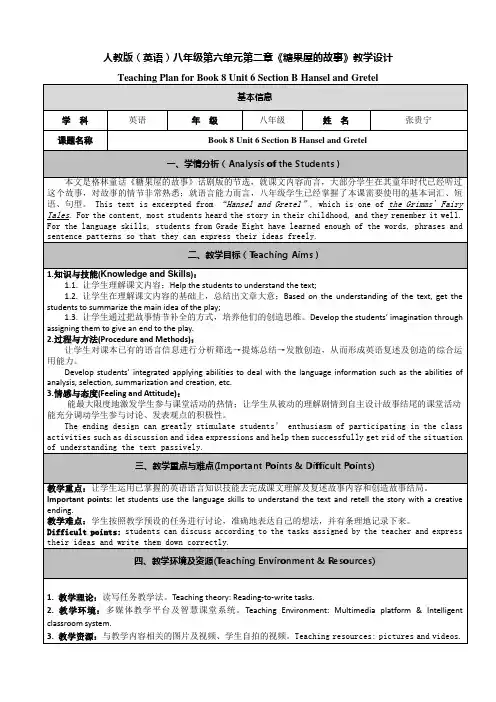
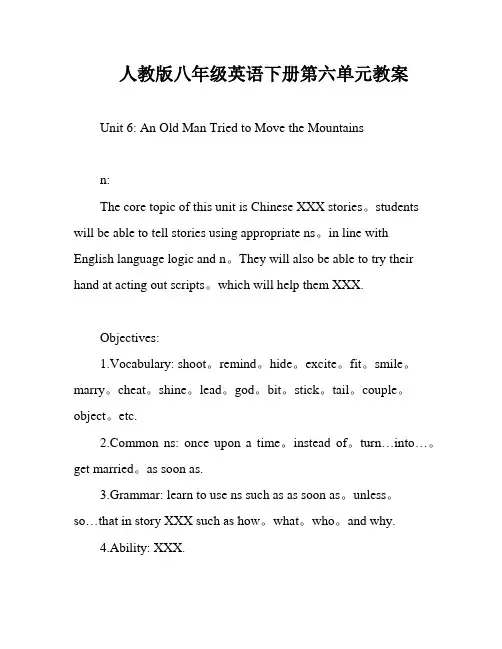
人教版八年级英语下册第六单元教案Unit 6: An Old Man Tried to Move the Mountainsn:The core topic of this unit is Chinese XXX stories。
students will be able to tell stories using appropriate ns。
in line with English language logic and n。
They will also be able to try their hand at acting out scripts。
which will help them XXX.Objectives:1.Vocabulary: shoot。
remind。
hide。
excite。
fit。
smile。
marry。
cheat。
shine。
lead。
god。
bit。
stick。
tail。
couple。
object。
etc.mon ns: once upon a time。
instead of。
turn…into…。
get married。
as soon as.3.Grammar: learn to use ns such as as soon as。
unless。
so…that in story XXX such as how。
what。
who。
and why.4.Ability: XXX.Process and Methods:XXX materials。
adjust and select the teaching content based on the actual level and language ability of the students。
reasonably arrange the number of hours for this unit。
and design the teaching content for each hour.Attitude and Values:1.XXX n。
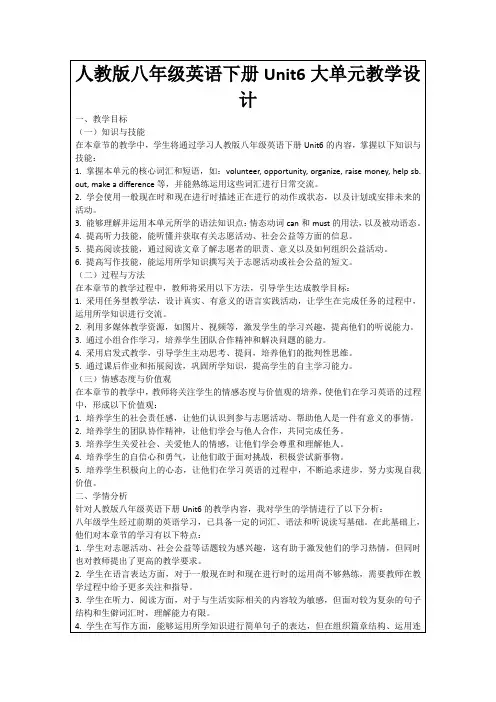
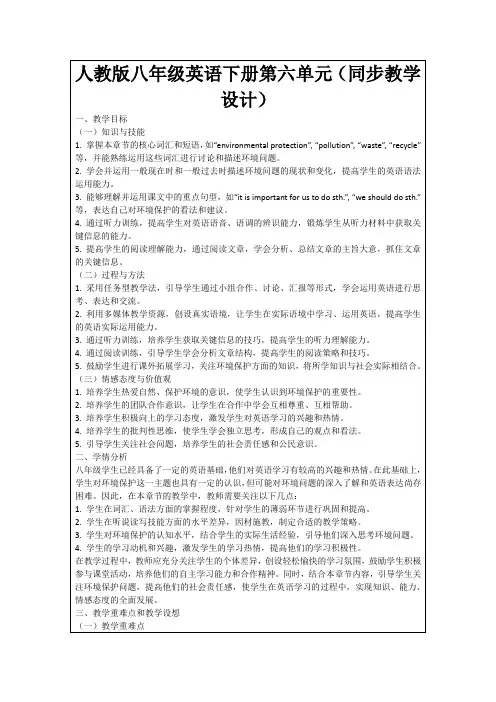
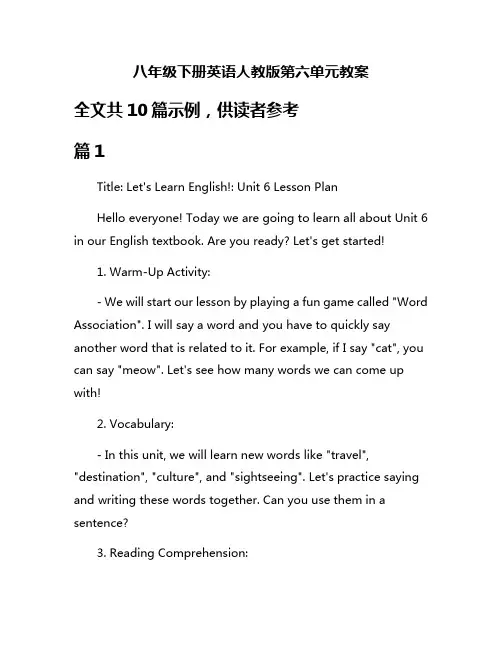
八年级下册英语人教版第六单元教案全文共10篇示例,供读者参考篇1Title: Let's Learn English!: Unit 6 Lesson PlanHello everyone! Today we are going to learn all about Unit 6 in our English textbook. Are you ready? Let's get started!1. Warm-Up Activity:- We will start our lesson by playing a fun game called "Word Association". I will say a word and you have to quickly say another word that is related to it. For example, if I say "cat", you can say "meow". Let's see how many words we can come up with!2. Vocabulary:- In this unit, we will learn new words like "travel", "destination", "culture", and "sightseeing". Let's practice saying and writing these words together. Can you use them in a sentence?3. Reading Comprehension:- We will read a short passage about a family trip to a famous landmark. After reading, we will discuss what the family did, what they saw, and how they felt during their trip. Remember to pay attention to the key details!4. Speaking Activity:- Now it's time to practice speaking English! We will pair up and take turns asking each other questions about our dream vacations. Where would you like to go? What would you like to do there? Let's have a conversation and practice our speaking skills.5. Writing Exercise:- For the writing exercise, we will write a postcard to a friend describing our imaginary trip to a foreign country. You can use the new words we learned in this unit to make your postcard interesting and informative. Don't forget to mention the food you ate, the places you visited, and the people you met!6. Grammar Focus:- Finally, we will review the grammar points from this unit, such as past tense verbs and adjectives. Let's do some exercises to practice using these grammar rules correctly in our sentences.That's all for today's lesson on Unit 6. I hope you had fun learning and practicing English with me. Keep up the good work and see you next time! Bye bye!篇2Hello everyone! Today, I'm going to share with you the lesson plan for Unit 6 of the 8th-grade English textbook. This unit is all about sports and exercise, so get ready to have some fun while learning!First, we will start the lesson by discussing different types of sports and exercise that we enjoy. We will talk about the benefits of staying active and healthy, and why it's important to include physical activity in our daily lives.Next, we will learn some new vocabulary related to sports and exercise. We will practice pronouncing the words and using them in sentences to help us remember their meanings.After that, we will read a passage about a famous athlete and discuss his or her achievements. This will help us understand the importance of hard work and dedication in achieving our goals.Following the reading, we will do a listening activity where we will listen to a conversation between two friends talkingabout their favorite sports. We will then answer questions about the conversation to test our listening comprehension skills.To wrap up the lesson, we will work on a group project where we will create our own sports magazine. We will include articles, interviews, and photos related to different sports and athletes. This will give us a chance to be creative and practice our writing skills.I hope you all are excited for this lesson and ready to have some fun learning about sports and exercise! Let's get started and make this lesson a memorable one!篇3Okay, let me try to write a summary of Unit 6 in the eighth grade English textbook, People's Education Press.Hey everyone! Today I want to talk about Unit 6 in our English textbook. This unit is all about making plans and asking for information in English. Sounds cool, right?In this unit, we will learn how to talk about future plans using the present continuous tense. For example, we can say "I am meeting my friends tomorrow" or "They are going to the movies this weekend." We will also learn how to ask for and giveinformation about schedules and locations. It's important to know if an event is happening on a specific day or at a certain place.We will practice making plans by talking about things like parties, outings, and vacations. We will also learn some useful phrases for asking questions, like "What are you doing this weekend?" or "Where are you going on your holiday?"By the end of this unit, we will be able to have conversations in English about our future plans and schedules. It's a fun and practical unit that will help us communicate better in English. Let's work hard and have fun learning together!That's the basic idea of Unit 6 in our English textbook. I hope you guys find it helpful and interesting. Let's keep learning and improving our English skills!篇4Oh my gosh, guys! Today I wanna talk to you about our English class. This unit is super fun and I can't wait to tell you all about it!So, in Unit 6 of our Grade 8 textbook, we're gonna learn all about sports and exercise. How cool is that? We're gonna talkabout different sports like basketball, soccer, and swimming. And we're also gonna learn some new words and phrases to help us talk about sports in English. It's gonna be awesome!In this unit, we're gonna do lots of fun activities to practice our English skills. We'll have listening exercises to help us improve our listening skills. We'll also do some speaking activities to practice talking about sports and exercise. And of course, we'll have some writing exercises to help us improve our writing skills. It's gonna be so much fun!I'm super excited to learn all about sports and exercise in English. I love playing sports, so I think this unit is gonna be really interesting. And who knows, maybe I'll even learn some new sports that I've never heard of before!I can't wait to get started with Unit 6. I know it's gonna be a blast! Let's all work hard and have fun learning English together. Let's go, Grade 8!篇5Hello everybody! Today I'm going to share with you the teaching plan for Unit 6 in the 8th Grade English textbook. Are you ready? Let's get started!First, we will start the class with a warm-up activity. We can play a fun game like "Word Chain" to review vocabulary from previous units. This will help us get into the English learning mood and warm up our brains for the lesson ahead.Next, we will move on to the main part of the lesson, which focuses on the theme of "Health and Fitness". We will introduce new vocabulary related to health and fitness, such as "diet", "exercise", and "healthy lifestyle". We will also learn about different ways to stay healthy, like eating nutritious food and getting enough exercise.After that, we will engage in some interactive activities to practice using the new vocabulary and grammar structures. For example, we can have a group discussion about healthy habits and create a poster to promote healthy living.Finally, we will wrap up the lesson with a revision activity to review what we have learned. This could be a quiz, a group game, or a worksheet to test our understanding of the key concepts in Unit 6.I hope you all enjoyed today's lesson and learned something new about health and fitness. Remember to keep practicing your English skills and stay healthy! See you next time! Bye bye!篇6Hi everyone, today I'm going to talk about our 8th grade English lesson plan for Unit 6 in the People's Education Press textbook. Are you guys ready? Let's get started!First, we will review some key vocabulary words from the unit, such as "environmental protection," "renewable energy," and "global warming." We'll play some fun games and do some activities to help us remember these words better.Next, we'll learn about the importance of environmental protection and how we can help protect our planet. We'll watch some videos, read some articles, and discuss in groups to deepen our understanding.After that, we'll talk about renewable energy sources like solar power, wind power, and hydropower. We'll learn how these sources can help reduce pollution and slow down global warming.To make the lesson more interactive, we'll do a project where each group will come up with a plan to promote environmental protection in our school. We'll present our ideas to the class and vote for the best one.Finally, we'll wrap up the lesson with a fun quiz to test our knowledge. Don't worry, it's not a test, just a friendly competition to see who can remember the most information from the lesson.I hope you guys are excited for this lesson! Let's work hard together to protect our environment and make the world a better place. Let's go, 8th graders!篇7Today I'm gonna share with you guys the lesson plan for Unit 6 in the 8th grade English textbook. It's gonna be super fun and interesting, so get ready to learn and have a good time!1. Warm-up Activity: To start off the lesson, we can play a game of "Simon Says" but using English commands. This will help students review vocabulary and practice listening skills.2. Introduction: Next, we can introduce the topic of "Global Warming" by showing a short video or a few pictures related to climate change. We can ask students to share what they already know about this topic and discuss why it is important.3. Reading Activity: After the introduction, we can move on to the reading activity. Students can read a short passage aboutthe causes and effects of global warming. We can then have a class discussion about the main ideas and key points in the text.4. Vocabulary Building: To help students understand the reading better, we can introduce some key vocabulary words related to the topic of global warming. We can do this through matching exercises, flashcards, or a fun game like "Vocabulary Bingo".5. Writing Activity: For the writing activity, we can ask students to write a short paragraph summarizing what they have learned about global warming. We can encourage them to use the vocabulary words we discussed earlier.6. Group Activity: To reinforce the new knowledge, we can have students work in groups to create a poster or a presentation about ways to reduce carbon emissions and combat climate change. This will allow them to collaborate, be creative, and practice their speaking skills.7. Review and Assessment: Finally, we can end the lesson with a quick review of the key points discussed in class. We can also give students a short quiz or a worksheet to assess their understanding of the material.Overall, this lesson plan will engage students, encourage critical thinking, and help them become more aware of environmental issues. Let's make a difference and save our planet together!篇8Hello everyone! Today I'm going to share with you the English lesson plan for Unit 6 in the eighth grade textbook. This unit is all about "Travelling". Are you ready? Let's get started!**Lesson 1: Learning Objectives**- Understand different types of travel- Learn vocabulary related to travel- Practice listening and speaking skills**Warm-up Activity:**Start the lesson by asking students about their favorite mode of transportation and why they like it.**Presentation:**Introduce different types of travel (such as air travel, train travel, car travel, etc.) using pictures and realia. Teach relatedvocabulary words like "departure", "arrival", "ticket", "passport", etc.**Practice:**Divide the class into pairs and have them role-play a conversation at the airport. One student can be the traveler and the other can be the airport staff.**Listening Activity:**Play a short audio clip of a travel announcement and have students listen carefully. Then ask them comprehension questions to check their understanding.**Homework:**Ask students to write a short paragraph about their dream travel destination and why they want to visit.**Lesson 2: Learning Objectives**- Discuss travel preferences- Use comparative and superlative adjectives- Practice reading and writing skills**Warm-up Activity:**Have students work in groups and discuss different travel destinations. Ask them to share their opinions on each destination.**Presentation:**Introduce comparative and superlative adjectives using examples related to travel. Teach students how to compare different travel options using these adjectives.**Practice:**Give students a list of travel destinations and have them work in pairs to compare and contrast each destination using comparative and superlative adjectives.**Reading Activity:**Have students read a short passage about a popular travel destination and answer comprehension questions based on the reading.**Writing Task:**Ask students to write a short essay comparing two travel destinations of their choice. Encourage them to use comparative and superlative adjectives in their writing.**Homework:**Assign a vocabulary review exercise for students to practice using the new words they have learned in this lesson.I hope you enjoyed this lesson plan for Unit 6 in the eighth grade English textbook. Have fun learning about travel and remember to practice your English skills every day! See you next time!篇9Oh my gosh, guys! Do I have a super fun lesson for you today! It's all about Unit 6 in our Grade 8 English textbook. Let's dive right in and see what cool stuff we're going to learn today!First up, we're going to talk about different types of festivals around the world. There are so many cool festivals like Chinese New Year, Thanksgiving, and Diwali. We'll learn about the traditions, food, and customs of these festivals. It's going to be so interesting!Next, we're going to learn about the importance of traditions and how they help to bring people together. We'll talk about why it's important to celebrate our own traditions and respect the traditions of others. It's all about understanding and appreciating different cultures.After that, we'll dive into some fun activities like role-playing a festival celebration and creating our own festival poster. We'll get to use our creativity and imagination to come up with something really cool. I can't wait to see what everyone comes up with!And finally, we'll wrap up the lesson by talking about how we can celebrate festivals in a more eco-friendly way. We'll learn about ways to reduce waste, conserve energy, and protect the environment while still having a great time. It's all about being responsible global citizens.Wow, guys, this lesson is going to be so much fun! I hope you're all as excited as I am to learn about festivals, traditions, and how to celebrate in a more sustainable way. Let's get started and have a blast in Unit 6!篇10Hello everyone! Today, I’m going to share with you the lesson plan for the sixth unit in the eighth grade English textbook. It’s going to be so much fun!First, we are going to start with a warm-up activity to get our brains ready for learning. We can play a quick game of charadesor have a spelling bee to review some vocabulary from the previous units.Next, we will move on to the main part of the lesson, which is about talking about daily routines. We will learn how to describe what we do every day using present simple tense. We can practice by asking each other questions like “What time do you wake up in the morning?” or “Do you have breakfast before going to school?”After that, we will work on some exercises in our textbooks to reinforce what we have learned. We can do somefill-in-the-blank exercises, match the sentence with the picture activities, and even role play different daily routines scenarios.To wrap up the lesson, we will have a fun group activity where we will create a skit about a typical day in the life of a student. We can perform our skits in front of the class and have a good laugh together.I hope you are all excited for this lesson! Let’s work hard and have a great time learning English together. See you in class!。
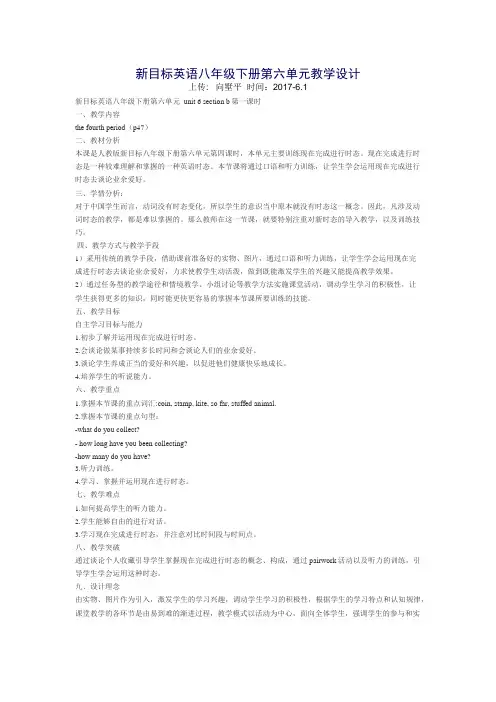
新目标英语八年级下册第六单元教学设计上传: 向墅平时间:2017-6.1新目标英语八年级下册第六单元 unit 6 section b第一课时一、教学内容the fourth period(p47)二、教材分析本课是人教版新目标八年级下册第六单元第四课时,本单元主要训练现在完成进行时态。
现在完成进行时态是一种较难理解和掌握的一种英语时态。
本节课将通过口语和听力训练,让学生学会运用现在完成进行时态去谈论业余爱好。
三、学情分析:对于中国学生而言,动词没有时态变化,所以学生的意识当中原本就没有时态这一概念。
因此,凡涉及动词时态的教学,都是难以掌握的。
那么教师在这一节课,就要特别注重对新时态的导入教学,以及训练技巧。
四、教学方式与教学手段1)采用传统的教学手段,借助课前准备好的实物、图片,通过口语和听力训练,让学生学会运用现在完成进行时态去谈论业余爱好,力求使教学生动活泼,做到既能激发学生的兴趣又能提高教学效果。
2)通过任务型的教学途径和情境教学、小组讨论等教学方法实施课堂活动,调动学生学习的积极性,让学生获得更多的知识,同时能更快更容易的掌握本节课所要训练的技能。
五、教学目标自主学习目标与能力1.初步了解并运用现在完成进行时态。
2.会谈论做某事持续多长时间和会谈论人们的业余爱好。
3.谈论学生养成正当的爱好和兴趣,以促进他们健康快乐地成长。
4.培养学生的听说能力。
六、教学重点1.掌握本节课的重点词汇:coin, stamp, kite, so far, stuffed animal.2.掌握本节课的重点句型:-what do you collect?- how long have you been collecting?-how many do you have?3.听力训练。
4.学习、掌握并运用现在进行时态。
七、教学难点1.如何提高学生的听力能力。
2.学生能够自由的进行对话。
3.学习现在完成进行时态,并注意对比时间段与时间点。
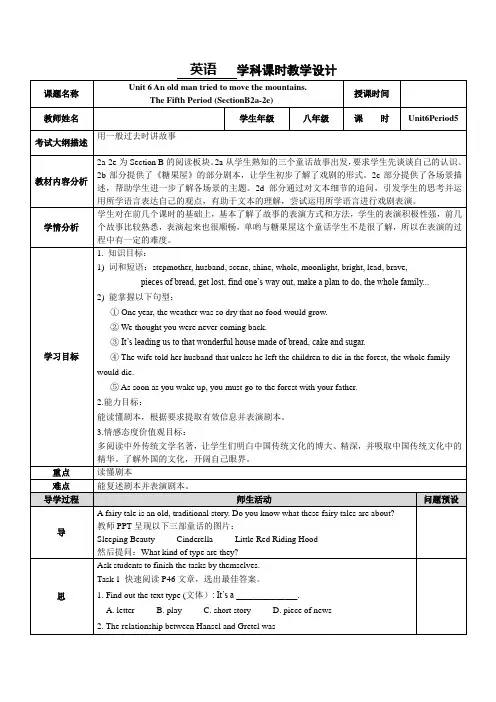
Unit 6 An old man tried to move the mountains.The Fifth Period ( Section B 2a—2e)教师寄语:Wisdom changes our life. 智慧改变人生。
【学习目标】1. 掌握本课时词汇的用法,如whole,lead等。
2. 读懂有关糖果屋的片段故事,并能表演出来。
【重点难点】重点:读懂剧本,获得相关信息,提高学生们的综合阅读能力。
难点:角色扮演,演绎糖果屋的故事。
【导学流程】Step 1 Knowledge links(知识链接)一.《韩塞尔与葛雷特》(Hansel and Gretel)Hansel and Gretel还可译作《糖果屋》《糖果屋历险记》,原是一则经典德国童话,被格林兄弟收录在著名的《格林童话》中。
故事讲述了一对兄妹被抛弃在大森林中,迷路的她们来到了女巫的糖果屋,被抓并差点被吃掉,但他们凭借机智与勇气,最终脱离魔掌。
二.重点短语1.leave sb. to do sth. 让某人去做某事2.the whole family 全部家人3.make a plan 制定计划4.in the moonlight 在月光下5.along the way 沿途6.be / get lost 迷路7.never mind. 没关系8.lead sb. to sp. 把某人带到某地9.lead the way带路10. lead to = cause 导致11.be made of 由...做成12.house made of bread 面包做成的房子Step 2 Basis awareness(基础感知)Task 1 快速阅读P46文章,选出最佳答案。
1. Find out the text type (文体): It’s a ______________.A. letterB. playC. short storyD. piece of news2. The relationship between Hansel and Gretel was ______________A. the emperor and the queenB. the prince and the princessC. the husband and the wifeD. a brother and a sisterTask 2 仔细阅读文章,判断正(T)误(F)。
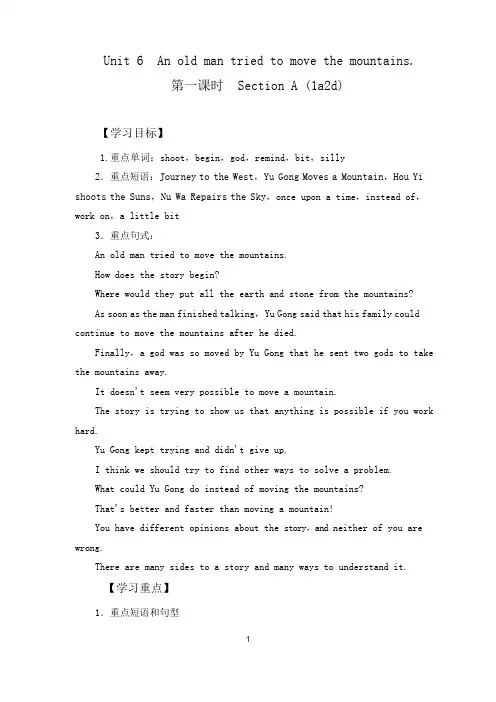
Unit6An old man tried to move the mountains.第一课时Section A(1a2d)【学习目标】1.重点单词:shoot,begin,god,remind,bit,silly2.重点短语:Journey to the West,Yu Gong Moves a Mountain,Hou Yi shoots the Suns,Nu Wa Repairs the Sky,once upon a time,instead of,work on,a little bit3.重点句式:An old man tried to move the mountains.How does the story begin?Where would they put all the earth and stone from the mountains?As soon as the man finished talking,Yu Gong said that his family could continue to move the mountains after he died.Finally,a god was so moved by Yu Gong that he sent two gods to take the mountains away.It doesn't seem very possible to move a mountain.The story is trying to show us that anything is possible if you work hard.Yu Gong kept trying and didn't give up.I think we should try to find other ways to solve a problem.What could Yu Gong do instead of moving the mountains?That's better and faster than moving a mountain!You have different opinions about the story,and neither of you are wrong.There are many sides to a story and many ways to understand it.【学习重点】1.重点短语和句型2.unless,so...that,as soon as...等的用法【学习难点】1.重点短语和句型2.unless,so...that,as soon as...等的用法【自学学习】一、预习课本P4142新单词并背诵,完成下面的汉译英。
人教英语八下Unit 6 An old man tried to move the mountains.整体单元设计一、语篇分析What:本单元围绕“传说故事”话题展开叙述,属于“人与社会”主题,社会文化与文学艺术子主题。
让学生了解中西方传说故事内容及表现形式,培养学生探索不同传说故事中的文化精神。
在Section A 部分呈现了中国民间神话,包含后羿射日,大闹天宫,女娲补天,愚公移山等。
通过听力活动,结合图片导入四个故事,并听取《愚公移山》这一故事的细节,完成简单语言输出。
之后在2a2c部分增加as soon as, but, so, finally等连词的教学,学生通过故事细节的了解,结合旧知,尝试开展故事讲述,并在最后就《愚公移山》故事展开讨论。
3a3c部分通过一篇有关西游记的篇章,引导学生理解大意和细节,并开展练习,回答问题。
Grammar环节通过疑问句及答句设置,引导学生巩固连词,故事写作逻辑顺序,细节内容提取及时态应用,为后续阅读和写作扎实基础。
Section B部分主要讲述西方童话故事,包含《皇帝的新装》和《糖果屋》,进一步拓展有关故事叙述的词汇和句法。
1a1d围绕《皇帝的新装》开展听力活动,通过听力了解故事情景,抓取关键信息,开展相应练习,并通过图片与听力结合进行故事输出。
在阅读板块,首先通过学生已知知识,谈论对睡美人,辛迪瑞拉,和小红帽三个童话故事的认识,然后开展《糖果屋》节选阅读活动,学习戏剧的形式,并设置了场景描述,提问的脚手架形式,再引导学生根据理解开展戏剧表演。
在最后的写作板块,设置了写作框架,让学生通过关键词填空完成写作。
Why:本单元选择“传说故事”主题,培养提升了解不同文化中的不同传说故事,有利于学生了解故事叙述方法,写作特点,同时培养学生探索不同故事底层的文化意义。
学生学习到愚公不畏艰险,不怕困难的精神,明白中国传统文化的博大,精深。
同时也接触到西方童话故事,思考不同文化下不同故事的表现形式和深层含义。
人教版八年级英语下册第六单元集体备课教案设计全文共3篇示例,供读者参考篇1Collective Lesson Plan for Unit Six in the Eighth Grade English Textbook of People's Education PressI. Title: Exploring the WorldII. Objectives:1. Students will be able to use new vocabulary related to travel and tourism in context.2. Students will be able to ask and answer questions about travel experiences.3. Students will be able to plan a trip and discuss their travel itinerary with a partner.4. Students will be able to give a presentation about a popular tourist destination.III. Materials:1. Textbook: Eighth Grade English Textbook of People's Education Press, Unit Six2. Worksheets on vocabulary, travel experiences, travel planning, and popular tourist destinations3. Pictures and videos of popular tourist destinations4. Projector and computer for multimedia presentationIV. Procedures:1. Warm-up:- Review vocabulary related to travel and tourism by playing a game of charades.- Discuss different types of transportation used for travel.2. Vocabulary:- Introduce new vocabulary related to travel and tourism, such as sightseeing, accommodation, itinerary, etc.- Practice using the new vocabulary in context through matching exercises and role-plays.3. Reading and Listening:- Read a short passage about a traveler's experience in a foreign country.- Listen to a dialogue between two friends discussing their recent trip.- Engage students in a pairwork activity where they ask and answer questions about their travel experiences.- Students practice planning a trip with a partner and discussing their travel itinerary.5. Writing:- Students write a short paragraph about their dream travel destination and share it with the class.- Students write a dialogue between two friends discussing their travel plans.6. Project:- Students choose a popular tourist destination and research information about it.- Students create a multimedia presentation to share with the class.7. Review and Assessment:- Review key concepts and vocabulary covered in the lesson.- Assess students' understanding through a quiz or test.1. Write a travel diary entry about a recent trip you took or a trip you would like to take in the future.2. Research a famous landmark in another country and writea short report about it.By following this collective lesson plan, students will develop their vocabulary, speaking, listening, reading, and writing skills while learning about travel and tourism.篇2Title: Lesson Plan Design for Unit 6 Collective Lesson Preparation in the Eighth Grade English TextbookObjectives:1. To develop students' listening, speaking, reading, and writing skills2. To deepen students' understanding of vocabulary related to food and restaurants3. To improve students' ability to ask and answer questions in English4. To strengthen students' ability to work collaboratively in a group settingMaterials:1. Textbook: Eighth Grade English Textbook Unit 62. Whiteboard and markers3. Audio recordings of conversations related to food and restaurants4. Pictures of different types of food and restaurants5. Worksheets for group activitiesProcedure:1. Warm-up (5 minutes)- Begin the lesson by asking students to share their favorite food and restaurant.- Play a fun vocabulary game related to food where students have to guess the word based on the description.- Introduce the topic of the lesson: "Food and Restaurants".2. Introduction to new vocabulary (10 minutes)- Present new vocabulary related to food and restaurants using pictures and gestures.- Have students repeat the words after you and practice pronunciation.- Provide definitions of the words and use them in sentences to give context.3. Listening and speaking activities (15 minutes)- Play audio recordings of conversations related to food and restaurants.- Have students listen and answer questions about the conversations.- Pair students up and have them role-play a conversation in a restaurant using the new vocabulary.4. Reading comprehension (15 minutes)- Assign a reading passage from the textbook about a food festival.- Have students read the passage individually and answer comprehension questions.- Discuss the passage as a class and ask students to summarize the main points.5. Group activities (20 minutes)- Divide students into groups and give each group a worksheet with questions related to food and restaurants.- Have students work together to answer the questions and discuss their answers.- Encourage collaboration and communication within the groups.6. Writing activity (10 minutes)- Ask students to write a short paragraph about their favorite food and restaurant.- Have students focus on using the new vocabulary and writing complete sentences.- Collect the paragraphs and provide feedback to each student.7. Review and reflection (5 minutes)- Review the new vocabulary and key points of the lesson with the class.- Ask students to reflect on what they have learned and how they can apply it in real-life situations.- Give students the opportunity to ask any questions they may have about the lesson.8. Homework assignment (5 minutes)- Assign homework that reinforces the vocabulary and concepts learned in class.- Encourage students to practice using the new words in sentences and conversations outside of the classroom.Conclusion:In this lesson, students will have the opportunity to improve their English skills while learning about food and restaurants. By incorporating listening, speaking, reading, and writing activities, students will be able to deepen their understanding of the topic and practice using the new vocabulary in a variety of contexts. Through collaborative group activities, students will also develop their teamwork skills and ability to communicate effectively with their peers. This lesson plan is designed to engage students and provide a fun and interactive learning experience.篇3Title: Collective Lesson Plan Design for Unit Six of the 8th Grade English TextbookIntroductionIn this lesson plan, we will focus on Unit Six of the 8th Grade English Textbook. The main objective of this unit is to help students learn and understand common expressions used in a job interview scenario. This unit is designed to improve students' speaking and listening skills, as well as their ability to effectively communicate in English in a professional setting.Lesson 1: Introduction to Job InterviewsObjective: To introduce students to common expressions and vocabulary used in job interviews.Activities:1. Introduce key vocabulary related to job interviews, such as "resume," "qualifications," and "experience."2. Have students practice asking and answering common interview questions in pairs.3. Play a listening activity where students listen to a mock job interview and answer questions based on the content.Lesson 2: Resume WritingObjective: To help students understand the components of a resume and how to write one effectively.Activities:1. Review the purpose of a resume and discuss the different sections it should include.2. Provide students with a template for writing a resume and have them fill it out with their own information.3. Peer review: Pair students up and have them exchange resumes to provide feedback on each other's work.Lesson 3: Mock InterviewsObjective: To give students practice in conducting and participating in job interviews.Activities:1. Divide students into pairs (interviewer/interviewee) and have them conduct mock interviews.2. Provide a list of common interview questions for students to use during the mock interviews.3. After the interviews, have students switch roles and repeat the exercise.AssessmentTo assess students' understanding and progress, the following methods will be used:- Observation of students' participation and engagement in class activities.- Listening comprehension quiz based on the mock job interview.- Peer evaluation of resumes.ConclusionThrough this collective lesson plan design, students will gain the necessary skills and confidence to navigate a job interview in English. By focusing on key vocabulary, practicing interview scenarios, and receiving feedback on their resumes, students will be better prepared for future professional opportunities.。
人教版八年级下册英语Unit 6集体备课教案一、教学目标知识目标:学生掌握与旅行相关的词汇和表达方式,能够阅读并理解关于旅行的简单文章。
能力目标:学生能够运用所学知识进行简单的旅行计划制定和描述,提高口语表达和写作能力。
情感目标:培养学生对旅行的热爱,通过旅行体验不同的文化和风景,增强跨文化交流的意识。
二、教学内容重点词汇:掌握与旅行相关的重点词汇,如景点、交通工具、住宿等。
句型表达:学习旅行计划的制定和描述的常用句型。
阅读理解:通过阅读简单的文章,理解旅行的意义和价值。
口语练习:模拟旅行情境,进行口语表达练习。
写作训练:根据所学知识,写一篇旅行计划或旅行日记。
三、教学难点与重点难点:如何引导学生运用所学知识进行口语表达和写作训练。
重点:掌握与旅行相关的词汇和表达方式,理解旅行的意义和价值。
四、教具和多媒体资源黑板:用于书写重点词汇和句型。
投影仪:播放与旅行相关的图片和视频,增强学生对旅行的感性认识。
教学软件:用于进行互动练习和测试。
五、教学方法激活学生的前知:通过提问学生过去的旅行经历和感受,激活学生的相关背景知识。
教学策略:采用讲解、示范、小组讨论、角色扮演等多种教学方法,引导学生积极参与课堂活动。
学生活动:组织学生进行旅行计划制定、口语表达和写作训练等活动,提高学生的实践能力和合作意识。
六、教学过程导入(5分钟)通过投影仪展示一些美丽的旅行景点图片,吸引学生的注意力。
随后提问学生关于旅行的感受和经历,引导学生进入本单元的主题。
讲授新课(30分钟)(1)介绍本单元的重点词汇和句型,通过例句和情境模拟帮助学生理解并运用。
(2)阅读理解:让学生阅读一篇关于旅行的文章,并提出问题让学生回答,检验学生的理解程度。
(3)口语练习:组织学生进行小组讨论,制定一个简单的旅行计划,并进行口头表达。
教师给予指导和反馈。
(4)写作训练:让学生写一篇旅行计划或旅行日记,要求运用所学知识,注意语法和拼写错误。
教师给予指导和评价。
Unit 6 An old man tried to move the mountains
Section A 3a—3c
Teaching plan
I. Teaching Goals
1. Knowledge Goals:
1) Key Vocabulary:object, magic, stick, hide, t ail, turn…into, excite, western
2) Target Language:
The Monkey is the main character in the traditional Chinese book Journey to the West.
The Monkey King can turn himself into different animals and objects. He can not turn himself into a man unless he can hide his tail.
2. Ability Goals:
1). Be able to understand the passage and learn to talk about the Monkey King using the target language.
2). Enable students to practice reading and writing with the target language.
3). Train students’ integrative and comprehensive abilities.
3. Emotional Goals:
Educate students to keep fighting against evils and bad deeds and never give up.
II. Key points and difficult points
1. Key Vocabulary:object, magic, stick, hide, tail, turn…into, excite, western
2. Key Expressions:
The Monkey is the main character in the traditional Chinese book Journey to the West.
The Monkey King can turn himself into different animals and objects. He can not turn himself into a man unless he can hide his tail.
3. Difficult Points:
Be able to understand the fairy story and tell their favorite story with target language.
III. Teaching steps.
1. Greetings
2. Review: Do you know these traditional stories of China?
3. Watch a video
4. Talk about the four main characters especially the Monkey King.
5. How much do you know about the Monkey King?
6. Teach the new words by showing some pictures.
New words: hide—hid, turn…into, object, magic stick, tail, excite, western.
7. While reading: Task 1: Skimming
Read the passage quickly and finish answering the question and match the main idea with each paragraph. They have two minutes.
Question: Which book is talked about?
Match the main idea.
Paragraph 1 Western children are also becoming interested in the
stories of the Monkey King.
Paragraph 2 The Monkey King is new to pupils in England but not
to Chinese children.
Paragraph 3 The Monkey King is not just normal monkey. He can
do magical things.
8. Check the answer.
9. While reading: Task 2: Careful reading.
Read paragraph 1 and tell T or F in two minutes.
1). In November 1978, pupils in England were able to watch a new TV program called Monkey. ()
2). Most of them were hearing this story for the second time. ()
3). The Monkey King is the main character in the traditional Chinese book Journey to the west. ()
Ask three students to tell their answers. If it is true, move to the next one, if it is false, ask the students to tell the correct answer. Then read the three sentences together.
10. Careful reading: Read paragraph 2 and finish the mind map. Time limit: 2 minutes.
11. Check the answer.
12. Read paragraph 3 and finish another mind map. Then check the answer.
13. Finish 3c. Check the answer after they finish it. Read these sentences together.
14. Game: House of card. (Optional)
1). Tell the rules of the game: Choose a card. If you are lucky enough you can get into the house directly and get some points. If you choose a number and you are asked to answer a question, then you have to answer it correctly to get some points. If you don’t give the right answer, there will be no points for you. And if you give up, no points either.
2). Play the game.
15. Read the passage while listening. Pay attention to the pronunciation.
16. Discussion: What do you think of the Monkey King? What is he like? Ask Ss to talk about their own opinion freely.
17. Summary: We talk about the main character the Monkey King from Journey to the West. He can do many things, but he cannot turn himself into a man unless he can hide his tail. His spirit should be learned by children both from China and Western countries.
18. Homework: 1). Tell your family or classmates about the Monkey King in English. 2). Try to recite the passage.
Remember: Never give up and be helpful. Where there is a will, there is a way.
19. Blackboard design.。